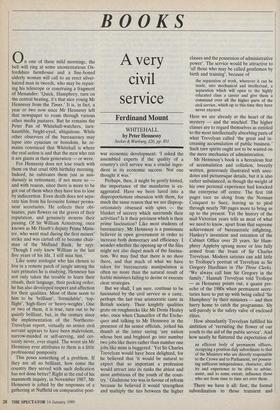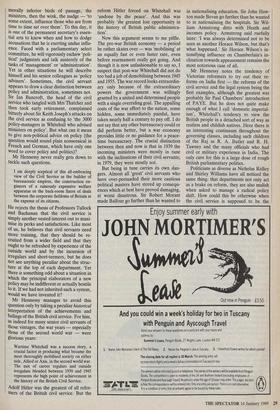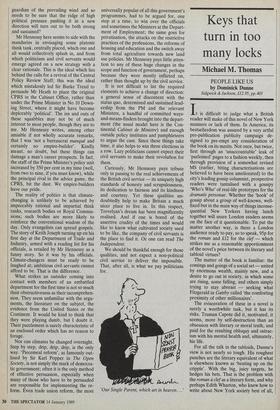BOOKS
A very
civil service
Ferdinand Mount
WHITEHALL by Peter Hennessy
Seeker & Warburg, £20, pp. 851
0 n one of these mild mornings, the bell will ring at some unostentatious Ox- fordshire farmhouse and a fine-boned elderly woman will call to an erect silver- haired man in tweeds, who may be repair- ing his telescope or construing a fragment of Menander: 'Quick, Humphrey, turn on the central heating, it's that nice young Mr Hennessy from the Times.' It is, in fact, a year or two now since Mr Hennessy left that newspaper to roam through various other media pastures. But he remains the Peter Pan of Whitehall-watchers, inex- haustible, bright-eyed, ubiquitous. While other observers of the bureaucracy may lapse into cynicism or boredom, he re- mains convinced that Whitehall is where the real action is and that the men who run it are giants in their generation — or were.
For Hennessy does not lose touch with them on that cruel 60th birthday morning. Indeed, he cultivates them just as assi- duously in retirement, if not more so and with reason, since there is more to be got out of them when they have less to lose by indiscretion. Even death does not sepa- rate him from his favourite former perma- nent secretaries. He collects their obi- tuaries, puts flowers on the graves of their reputation, and genuinely mourns their passing. Of Sir William Armstrong, once known as Mr Heath's deputy Prime Minis- ter, who went mad during the first miners' strike and was carted off to become chair- man of the Midland Bank, he says: `Though I only knew William in the last five years of his life, I still miss him.'
Like some zoologist who has chosen to live in a remote patch of jungle among the rare primates he is studying, Hennessy has not only taken the trouble to learn their rituals, their language, their pecking order; he has also developed respect and affection for their qualities. Most of them seem to him to be 'brilliant', 'formidable', 'top- flight', 'high-fliers' or 'heavy-weights'. One or two of them, it is true, turn out to be quietly brilliant, but, in the century since the implementation of the Northcote- Trevelyan report, virtually no senior civil servant appears to have been malevolent, narrow-minded or self-serving, and cer- tainly never, ever stupid. The worst sin Mr Hennessy ever attributes to them is a little professional pomposity.
This poses something of a problem. If they are all so brilliant, how come the country they served with such dedication has not done better? Right at the end of his mammoth inquiry, in November 1987, Mr Hennessy is jolted by the responses of a gathering at Nuffield on comparative post- war economic development: 'I asked the assembled experts if the quality of a country's civil service was a crucial ingre- dient in its economic success. Not one thought it was.'
Perhaps, then, it might be gently hinted, the importance of the mandarins is ex- aggerated. Have we been lured into a disproportionate obsession with them, for much the same reason that we are disprop- ortionately obsessed with spies — the blanket of secrecy which surrounds their activities? Is it their priviness which is their prime fascination? Like most students of bureaucracy, Mr Hennessy is a passionate believer in open government in order to increase both democracy and efficiency. I wonder whether the opening up of the files might not also dispel much of the fascina- tion. We may find that there is no there there, and that much of what we have taken for bureaucratic manipulation is often no more than the natural result of feeble ministers failing to devise or execute clear strategies.
But we shall, I am sure, continue to be fascinated by the civil service as a caste, perhaps the last true aristocratic caste in British society. Their knightly qualities grate on roughnecks like Mr Denis Healey who, once when Chancellor of the Exche- quer and talking to Mr Hennessy in the presence of his senior officials, jerked his thumb at the latter saying 'any nation whose best and brightest go into number two jobs like theirs rather than number one jobs like mine is buggered.' Yet Sir Charles Trevelyan would have been delighted, for he believed that it would be natural to expect that so important a profession would attract into its ranks the ablest and most ambitious of the youth of the coun- try.' Gladstone too was in favour of reform because he believed it would 'strengthen and multiply the ties between the higher classes and the possession of administrative power'. The service would be attractive to `all those who may be called gentlemen by birth and training', because of
the separation of work, wherever it can be made, into mechanical and intellectual, a separation which will open to the highly educated class a career and give them a command over all the higher parts of the civil service, which up to this time they have never enjoyed.
Here we are already at the heart of the mystery — and the mischief. The higher classes are to regard themselves as entitled to the most intellectually absorbing parts of what Trevelyan called 'the great and in- creasing accumulation of public business.' Such rare spirits ought not to be wasted on the mere mechanics of administration.
Mr Hennessy's book is a herculean feat of accumulation and collation, breezily written, generously illustrated with anec- dotes and picturesque details, but it is also rather unbalanced, as though the weight of his own personal experience had knocked the enterprise off centre. The first 168 pages race us along from the Norman Conquest to Suez, leaving us to plod through nearly 700 pages more to bring us up to the present. Yet the history of the mid-Victorian years tells us most of what we need to know, apart from that supreme achievement of bureaucratic infighting, Hankey's invention and retention of the Cabinet Office over 20 years. Sir Hum- phrey Appleby sprang more or less fully armed from the brain of Sir Charles Trevelyan. Modern satirists can add little to Trollope's portrait of Trevelyan as Sir Gregory Hardlines in The Three Clerks. `We always call him Sir Gregory in the family,' Hannah Trevelyan told Trollope — as Hennessy points out, a quaint pre- echo of the 1980s when permanent secre- taries have to put up with being called 'Sir Humphrey' by their ministers — and then hurry home to catch the programme. Sly self-parody is the safety valve of enclosed elites.
How abundantly Trevelyan fulfilled his ambition of 'recruiting the flower of our youth to the aid of the public service'. And how neatly he flattered the expectation of
an efficient body of permanent officers, occupying a position duly subordinate to that of the Ministers who are directly responsible to the Crown and to Parliament, yet possess- ing sufficient independence, character, abil- ity and experience to be able to advise, assist, and to some extent, influence those who are from time to time set over them.
There we have it all: first, the formal subordination to those transient and morally inferior birds of passage, the ministers, then the wink, the nudge — 'to some extent, influence those who are from time to time set over them'. To this day, it is one of the permanent secretary's essen- tial arts to know when and how to dodge accusations that he is exerting undue influ- ence. Faced with a parliamentary select committee, he will vigorously eschew 'poli- tical' judgments and talk austerely of the tasks of 'management' or 'administration'. Yet in other situations he will describe himself and his senior colleagues as 'policy advisers'. Sometimes, the civil servant appears to draw a clear distinction between policy and administration, sometimes not. Sir Ian Bancroft, the head of the civil service who tangled with Mrs Thatcher and then took early retirement, complained bitterly about Sir Keith Joseph's attacks on the civil service as confusing to 'the 3000 policy-managers in Whitehall who advised ministers on policy'. But what can it mean to give non-political advice on policy (the question would sound plain nonsensical in French and German, which have only one word to cover policy and politics)?
Mr Hennessy never really gets down to tackle such questions.
I am deeply sceptical of this all-embracing view of the Civil Service as the builder of bureaucratic empires, the construction en- gineers of a ruinously expensive welfare apparatus or the back-room fixers of deals between the corporate fiefdoms of Britain at the expense of its citizens.
He rejects the thesis of Professors Tullock and Buchanan that the civil service is simply another vested interest out to maxi- mise its perks and satisfactions. Like most of us, he believes that civil servants need more training, that they should be re- cruited from a wider field and that they Ought to be refreshed by experience of the outside world and by the incursion of Irregulars and short-termers, but he does not see anything peculiar about the struc- ture at the top of each department. Yet there is something odd about a situation in which the principal elaborators of a new Policy may be indifferent or actually hostile to it. If we had not inherited such a system, would we have invented it?
Mr Hennessy manages to avoid this question only by taking a peculiar historical interpretation of the achievements and failings of the British civil service. For him, as indeed for many senior civil servants of those vintages, the war years — especially those of the second world war — were glorious years: Wartime Whitehall was a success story, a crucial factor in producing what became the most thoroughly mobilised society on either side, Allied or Axis, in the second world war. The mix of career regulars and outside irregulars blended between 1939 and 1945 represents the high point of achievement in the history of the British Civil Service.
Adolf Hitler was the greatest of all refor- mers of the British civil service. But the reform Hitler forced on Whitehall was `undone by the peace'. And this was probably 'the greatest lost opportunity in the history of British public administra- tion'.
Now this argument seems to me piffle. The pre-war British economy — a period he rather skates over — was 'mobilising' at an equally fast or even faster rate, even before rearmament really got going. And though it is now unfashionable to say so, I suspect that post-war Whitehall did not do too bad a job of demobilising between 1945 and 1955. The war record looks extraordin- ary only because of the extraordinary powers the government was willingly granted by a united and determined people with a single overriding goal. The appalling costs of the war effort to the nation, some hidden, some immediately painful, have taken nearly half a century to pay off. I do not say that any other bureaucracy could or did perform better, but a war economy provides little or no guidance for a peace- time bureaucracy. The crucial distinction between then and now is that in 1939 the incoming ministers were mostly in tune with the inclinations of their civil servants; in 1979, they were mostly not.
But being in tune carries its own dan- gers. Almost all 'great' civil servants who have over-persuaded their more cautious political masters have stored up consequ- ences which at best have proved damaging, at worst disastrous. Sir Robert Morant made Balfour go further than he wanted to in nationalising education. Sir John Haw- ton made Bevan go further than he wanted to in nationalising the hospitals. Sir Wil- liam Armstrong ditto with Heath and incomes policy. Armstrong said ruefully later: was always determined not to be seen as another Horace Wilson, but that's what happened.' Sir Horace Wilson's in- tensifying influence on Chamberlain's in- clination towards appeasement remains the most notorious case of all.
Mr Hennessy notes the tendency of Victorian reformers to try out their re- forms on India first — the reforms of the civil service and the legal system being the first examples, although the greatest was probably Sir Paul Chambers' introduction of PAYE. But he does not quite make enough of what I call 'domestic imperial- ism', Whitehall's tendency to view the British people in a detached sort of way as restless and childish natives. Here there is an interesting continuum throughout the governing classes, including such children of the Raj as R. A. Butler and R. H. Tawney and the many officials who had civil or military experience in India. The only cure for this is a large dose of rough British parliamentary politics.
Politicians as diverse as Nicholas Ridley and Shirley Williams have all noticed the same thing: that departments not only act as a brake on reform, they are also mulish when asked to manage a radical policy shift. How could this be otherwise when the civil service is supposed to be the guardian of the prevailing wind and so needs to be sure that the ridge of high political pressure pushing it in a new direction will turn out to be both strong and sustained?
Mr Hennessy here seems to side with the mandarins in envisaging some platonic think tank, centrally placed, which one and all would collectively splash in, and from which politicians and civil servants would emerge agreed on a new strategy with a clear rationale. This is the ideal which lies behind the calls for a revival of the Central Policy Review Staff; this was the ideal which mistakenly led Sir Burke Trend to persuade Mr Heath to place the original CPRS in the Cabinet Office, rather than under the Prime Minister in No 10 Down- ing Street, where it might have become deplorably 'political'. The ins and outs of these squabbles may not be of much interest to most people, though they are to me. Mr Hennessy writes, among other amiable if not wholly accurate remarks, that I was `not a bureaucrat marque and certainly no empire-builder'. Kindly meant, no doubt, but these things can damage a man's career prospects. In fact, the staff of the Prime Minister's policy unit increased by 350 per cent in my time (well, from two to nine, if you must know), while the principal rival in the advice game, the CPRS, bit the dust. We empire-builders have our pride.
The reality of politics is that climate- changing is unlikely to be achieved by impeccably rational and impartial think tanks, research bodies or Royal Commis- sions; such bodies are more likely to reinforce the conventional wisdom of the day. Only evangelists can spread gospels. The story of Keith Joseph turning up on his first day at the Department of Trade and Industry, armed with a reading list for his officials, is retailed by Mr Hennessy as a funny story. So it was by his officials. Climate-changers must be ready to be laughed at; ambitious civil servants cannot afford to be. That is the difference.
What strikes an outsider coming into contact with members of an embattled department for the first time is not so much their obstructiveness as their incomprehen- sion. They seem unfamiliar with the argu- ments, the literature on the subject, the evidence from the United States or the Continent. It would be kind to think that they were playing dumb, but I doubt it. Their puzzlement is surely characteristic of an enclosed order which has no reason to forage.
Nor can climates be changed overnight. Step by step, drip, drip, drip, is the only way. 'Piecemeal reform', as famously out- lined by Sir Karl Popper in The Open Society, is not simply the mark of democra- tic government; often it is the only method of effective persuasion, especially when many of those who have to be persuaded are responsible for implementing the re- form. Even trade union reform, the most universally popular of all this government's programmes, had to be argued for, one step at a time, to win over the officials and sometimes the Ministers at the Depart- ment of Employment; the same goes for privatisation, the attacks on the restrictive practices of the professions, the reforms of housing and education and the switch away from total agriculture towards new land use policies. Mr Hennessy pays little atten- tion to any of these huge changes in the scope and function of government, perhaps because they were mostly inflicted on, rather than thought up by the civil service.
It is not difficult to list the required elements to achieve a change of direction: a general sense of discontent with the status quo, determined and sustained lead- ership from the PM and the relevant Ministers, a handful of committed ways- and-means-finders brought into the depart- ment (the usual model here is the Con- tinental Cabinet de Ministre) and enough outside policy institutes and pamphleteers to argue the case. Since these things take time, it also helps to win three elections in a row. Lazy politicians cannot expect their civil servants to make their revolution for them.
Curiously, Mr Hennessy pays tribute only in passing to the real achievements of the British civil service — its uniquely high standards of honesty and scrupulousness, its dedication to fairness and its kindness and courtesy. Yet these qualities un- doubtedly help to make Britain a much nicer place to live in. In this respect, Trevelyan's dream has been magnificently realised. And if one is bored of the assertive crudity of the times and would like to know what cultivated society used to be like, the company of civil servants is the place to find it. Or one can read The Independent.
We should be thankful enough for those qualities, and not expect a non-political civil service to deliver the impossible. That, after all, is what we pay politicians for.
`Our Single Single Parent, which art in heaven...'




















































 Previous page
Previous page